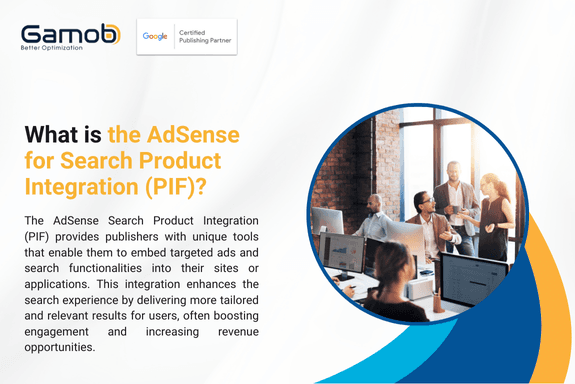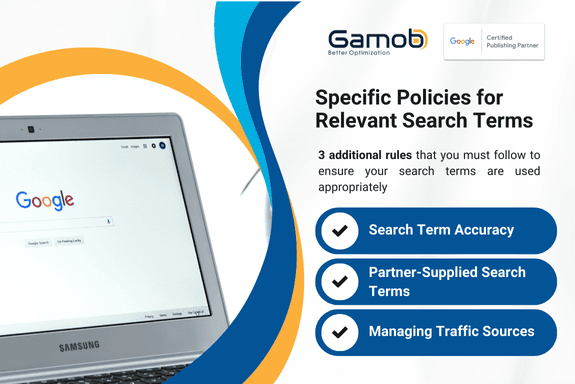Publisher Resources
AdSense for Search Product Integration Policy: Your Ultimate Guide to Compliant Integration
Tracy Nguyen
December 11, 2024

Subscribe to receive the latest blog posts to your inbox every week.
By subscribing you agree to with our Privacy Policy.
In the ever-evolving world of digital advertising, Google AdSense for Search (AFS) offers a unique opportunity for publishers to monetize their websites and apps by integrating tailored search results and relevant ads. With this feature, publishers can enhance the user experience by providing Google’s search results directly on their platforms, thereby increasing engagement and driving revenue. However, to maintain the integrity of the service, Google has set up a comprehensive set of guidelines that must be followed when using the AdSense for Search Product Integration Features (PIF).
In this blog, we’ll dive deep into the AdSense for Search Product Integration Policy, break down the types of PIF available, and walk you through the essential steps to ensure your integration is fully compliant. Whether you’re a seasoned AdSense user or just getting started, this guide will provide you with all the information you need to maximize your ad revenue while staying within Google’s policies.
What Is the AdSense for Search Product Integration (PIF)?
The AdSense for Search Product Integration (PIF) consists of specialized tools within AdSense that allow publishers to integrate targeted ads and search results into their websites or apps. By doing so, publishers can offer a more relevant and personalized search experience for users, which often leads to better engagement and higher revenue.

There are three main types of PIF available for integration:
Intent-Based Ads: These ads are shown based on the searcher’s intent and the type of search they perform.
Relevant Search Terms for Auto Ads: These search terms are automatically suggested by Google to trigger relevant ads.
Relevant Search Terms for Content Pages: This feature uses content-specific search terms to display ads that match the page’s theme.
These features are designed to help you serve more relevant ads to your users, which improves the overall user experience while increasing your monetization potential. However, using PIF comes with a strict set of policies that ensure fairness and quality. Let’s explore those in more detail.
Core AdSense for Search Product Integration Policies
Before you start using AdSense for Search PIF, it’s crucial to understand the core of Adsense for Search’s policies and the key policies that govern their use. Here’s what you need to know to stay compliant:
1. Adherence to Google’s Publisher Policies
As a publisher, it’s your responsibility to ensure that your website or app aligns with Google’s Publisher Policies. These policies cover a wide range of rules about content quality, user experience, and compliance with legal requirements. Non-compliance can lead to the removal of ads or even suspension from the AdSense program.
Key Points:
Ensure your content complies with Google’s guidelines, including restrictions on prohibited content like illegal material or misleading claims.
These rules apply not only to the search results but also to all content on your site, including ads.
2. No Manipulation or Modification of Search Terms
A major part of the AdSense for Search Product Integration Policy is ensuring that search terms remain authentic. This means you cannot manipulate or modify search queries in any way to artificially inflate your ad revenue. The goal is to provide users with genuine, relevant search results based on their queries, not trick them into engaging with ads.
Key Points:
Search terms must be genuine: You can’t pre-fill the search box with terms or create deceptive links that alter search results.
No deceptive tactics: Do not use misleading text like “Click here for the best deal” to attract users to click on ads or interact with search results in unnatural ways.
These guidelines are essential for preserving the integrity of Google’s advertising ecosystem and providing users with the best possible experience.
3. Don’t Alter or Filter PIF Elements
Another key rule is that you cannot alter or filter PIF elements unless you do so through the settings available in your AdSense account. While you can adjust certain settings, such as using Auto Ads or configuring relevant search terms, you cannot modify the underlying ads or search results themselves.
Key Points:
No unauthorized changes: The layout, design, and content of ads and search results must remain as per Google’s standards.
You may customize certain settings through your AdSense account but only within the allowed parameters.
4. No Clickbait or Deceptive Practices
Google has a zero-tolerance policy for deceptive practices aimed at generating unintended clicks. You cannot design PIF features to trick users into clicking ads or interacting with them in misleading ways. Clickbait, fake deals, and other forms of deception are strictly prohibited.
Key Points:
No misleading elements: You can’t use text or design elements that trick users into clicking on ads.
Authentic user interaction: The focus should always be on providing a relevant, honest search experience rather than manipulating clicks.
Specific Policies for Relevant Search Terms
When using the Relevant Search Terms for Content Pages feature, there are additional rules that you must follow to ensure your search terms are used appropriately.

1. Search Term Accuracy
When users click on a search term, the results must match exactly what they searched for. For instance, if a user searches for “red roses,” the results displayed should correspond to that exact term, and not a more general term like “roses” or “flower arrangements.”
Key Points:
Exact match requirement: The search term entered by the user must match exactly the search results and ads displayed.
2. Partner-Supplied Search Terms
Sometimes, you can suggest additional search terms to Google for use in relevant search ads. However, these terms must adhere to strict rules to ensure they don’t violate Google’s broader advertising policies.
Key Points:
No prohibited content: Partner-supplied search terms must comply with all content policies and must not promote restricted or prohibited material.
Must be relevant: The suggested terms should enhance the relevance of the ads and not be designed to manipulate ad performance artificially.
3. Managing Traffic Sources
When directing users to pages that contain relevant search ads, you must ensure that the traffic source is legitimate and relevant to the content of the page.
Key Points:
No misleading traffic sources: Traffic sources must match the content on the landing page and accurately describe what users will find when they click through.
Avoid false promises: Do not mislead users with offers that are hard to find or don’t exist on the landing page.
How to Effectively Manage Traffic and Search Term Validity
Managing traffic and ensuring the validity of search terms are essential aspects of using AdSense for Search PIF responsibly. Here are some best practices for ensuring that your search terms and traffic sources stay compliant with Google’s guidelines:
1. Ensure Legitimate and Relevant Traffic
The traffic you direct to pages that display PIF ads should be genuine and match the user’s search intent. Don’t use misleading tactics to bring users to pages that don’t align with their expectations.
Key Points:
Accurate traffic description: The traffic sources should align with the content of the page and accurately reflect what users will find when they click through.
2. No Artificial Traffic or Click Manipulation
Google does not allow publishers to engage in practices that artificially inflate clicks or impressions. This includes tactics like generating fake traffic or using deceptive methods to get users to click on ads.
Key Points:
Avoid fake traffic: Don’t engage in traffic farming or other methods of artificially boosting clicks or impressions.
Integrating AdSense for Search Product Integration Features (PIF) can be a powerful way to enhance the user experience on your website or app while generating additional revenue. However, it’s essential to adhere to Google’s strict policies to ensure that the system remains fair and beneficial for both users and publishers.
However, it is so complicated if you do not really understand about the operation of Adsense for search (AFS), so one of the good solutions is to collaborate with GCPP to support you. Instead of handling AFS implementation yourself, partner with experts like Gamob, a Google Certified Publishing Partner. With over five years of experience, we help publishers maximize revenue by seamlessly integrating Google’s advertising solutions.
[Source: Google.com]
---------------------
Gamob | GCPP - Empower your monetization journey
Email: [email protected]
Website: www.gamob.com
Linkedin: www.linkedin.com/company/gamob-gcpp